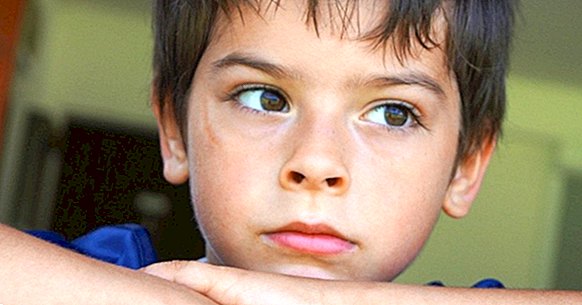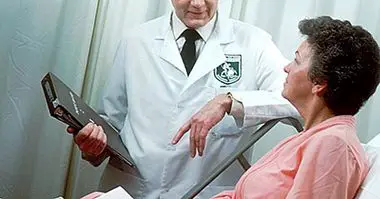Infant encopresis (incontinence): causes, types and treatment
Many children, and even some adults, have suffered some type of incontinence, be it urinary or fecal. With regard to fecal incontinence , in a large number of cases we can find that this loss of control may be due to a disease such as gastroenteritis or epilepsy, loss of muscle tone in the sphincters due to age, the presence of alterations such as those caused for surgery or the consumption of some substances.
But the cause is not always organic: sometimes sensations and emotions such as fear or anxiety, or even laughter, can end up with at least a part of our organic waste can not be retained (there are even popular expressions about it). When this occurs in the absence of pathology and in a frequent way we are talking about a problem or disorder called encopresis, and if it occurs in children it is called infant encopresis .
- Related article: "Enuresis (urinating on): causes, symptoms and treatment"
A disorder of excretion
Encopresis is defined as the disorder characterized by Stool deposition repeatedly and frequently for at least three months in inappropriate places such as clothing or the floor, which may be involuntary or voluntary deposition.
For the diagnosis of this disorder, classified as an excretion disorder together with enuresis or urinary incontinence, it is necessary that the subject is at least four years of age (when a large part of the children already have control of their bowels) and the incontinence is not due to the presence of a disease or physiological alteration beyond of possible constipation, or the consumption of substances such as laxatives or food in poor condition.
This disorder can cause the presence of deep feelings of shame or guilt in the child , which sometimes ends up leading to having problems bonding affectively with others, as well as hiding bowel movements when they occur involuntarily.
Types of encopresis according to the sphincter control
The infant encopresis can be classified in primary and secondary depending on whether the problem is that the meno has not controlled at any time the process of excretion or is due to a lack of control produced by a particular element.
Primary encopresis
The primary or continuous encopresis is one in which the minor has not shown at any time to be able to control the emission of feces, despite having a sufficiently advanced level of development as to be able to do it.
Secondary encopresis
Also called discontinuous encopresis, in it the subject in he has previously acquired good control of his sphincters and the emission of feces, but for some reason in the present has stopped doing so. In other words, in secondary encopresis incontinence is not due to the fact that the minor has not yet been able to control defecation beforehand.
Types of encopresis according to the level of stool retention
The infantile encopresis can be divided into two depending on whether the excretion is performed due to excessive retention of feces by the child or if it occurs in the absence of any type of constipation .
Retentive encopresis
The retentive encopresis or constipation and incontinence due to overflow occurs when the child prolongedly retains the emission of stool, may be two weeks without defecation. The boy or girl ends up making his stools due to overflow, first expelling unsound stools and subsequently hard stools of great consistency that supposes a certain level of pain to expel .
Non-retentive encopresis
In this type of encopresis without constipation or incontinence due to overflow there is no excessively prolonged retention , not having a serious constipation. The minor's stools are normal.
Possible causes (etiology)
Over time the possible causes of this disorder have been explored, finding that the main causes of infantile encopresis are psychological. But nevertheless, there are organic factors that can influence in his presence such as the tendency to constipation.
When the encopresis is primary, it is considered that it may be due to the fact that the child has not managed to reach an incorrect learning of the control of the sphincters, and the minor can not recognize the signals that warn of the need to defecate.
In the case of secondary encopresis, the main etiology is the existence of some type of sensation that causes the minor to retain stools or lose control over them. Fear and anxiety These are some of the emotions that can elicit this loss of control.Living in conflict situations, with intrafamily violence or in precarious conditions can cause some children to react suffering from this disorder.
Another very linked aspect has to do with the type of education that is given to the boy or girl : Overreliance on the part of parents who provide an education too rigid can generate fear of failure and punishment that can result in a loss of control, or in the case of an excessively permissive or ambivalent education that causes insecurity or fear of face the outside world. In cases where defecation in inappropriate places is voluntary, we can face a show of rebellion on the part of the minor.
- Maybe you're interested: "Child Stress: some basic tips for parents in distress"
Treatment
The treatment of encopresis usually incorporates a multidisciplinary methodology, incorporating psychological, medical and nutritional aspects .
With regard to psychological treatment, this will focus on the realization of a training in defecation habits that will be enhanced through the use of positive reinforcements. First, it must be evaluated if there is an emotional reason behind defecation and / or stool retention, and if positive, they must be treated by the appropriate means. For example, systematic desensitization or relaxation in cases of anxiety.
As for the defecatory process itself, the child will be taught first to identify the warning signs of the need to evacuate, to subsequently shape and model the practice of appropriate habits so that the child is increasingly autonomous.
At all times the acquisition of behaviors will be reinforced, using techniques such as chip economy, both before and during and after defecation (when the child goes to the bathroom, evacuates in the toilet and stays clean). Occasionally punishment has also been used as part of the process, such as making him clean dirty clothes, but it is fundamental not to cause guilt or diminish the child's self-esteem.
Nutritional and medical intervention
Regarding nutrition and medical aspects, regardless of whether incontinence is not due to organic causes Drugs that help with evacuation can be prescribed in specific situations or enemas that allow to soften the stool in case of constipation. In fact, the doctor and the psychologist should guide the use of laxatives while training in defecatory habits.
It is also advisable to provide the infant a balanced diet rich in fiber that helps the child to carry out their evacuations in a normative way, together with an abundant hydration.
Bibliographic references:
- American Psychiatric Association. (2013). Diagnostic and Statistical Manual of Mental Disorders. Fifth edition. DSM-V. Masson, Barcelona.
- Thief, A. (2012). Child Clinical Psychology. CEDE Preparation Manual PIR, 03. CEDE: Madrid.



















